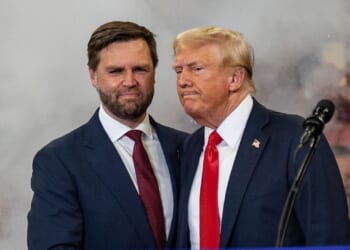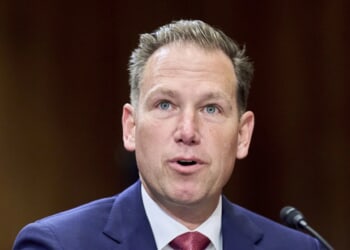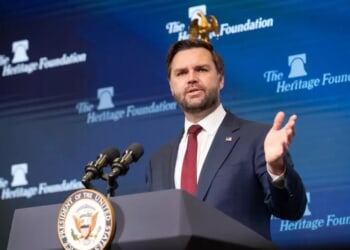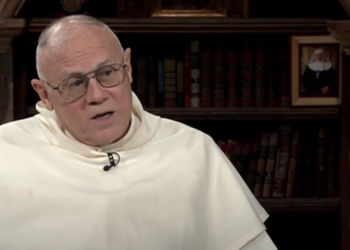Visitors to Western Europe have grown accustomed to young male migrants hawking selfie sticks, demanding a few euros, or — most often — simply loitering. Cities behind the former Iron Curtain have largely avoided this transformation. In Warsaw and other Polish cities, slowly but perceptibly, it is occurring in real time.
On a recent day in Warsaw, a young African man hassled and blocked the paths of pedestrians crossing ulica Emilii Plater, in the shadow of the Palace of Culture and Science, Stalin’s infamous gift to the Polish people. “We are fifty or a hundred years behind the advanced countries,” once asserted the Soviet dictator. “We must make good this distance in ten years.”
Scenes that would have been unfathomable a decade ago are proliferating across Poland. In one of last year’s most viral moments, a Senegalese man defecated in a reservoir, evoking widespread shock and endless social-media commentary. Earlier this month, a Jamaican man stabbed and severely wounded a fellow passenger exiting a Warsaw tram. This genre of news story, once enumerable by hand, is distressingly common. (RELATED: The Scandinavian Lesson: What Malmö Warns Us About America’s Sanctuary Cities)
The issue generates a mounting psychological impact on Polish society. Last month, Muslim worshippers filled the street in front of a mosque in Gdańsk to mark Eid; similar scenes were visible in Warsaw, Kraków, and Wrocław. A new Jordanian-funded three-story mosque in Warsaw will hold over 1,000 people. In industrial Katowice, the Center of Islamic Culture sits just off the main thoroughfare. (RELATED: Poland Sees Surge in Anti-Catholic Sentiment)
Inward migration to Poland can be categorized as economic, political, and irregular, with the latter two receiving most media attention.
As a large member state with little recent migration history (excepting from neighbors Ukraine and Belarus), Poland has been in the EU’s migrant-redistribution crosshairs. The topic is predictably intertwined with eternal rival Germany. In recent years, Berlin has dispatched thousands of migrants to Poland with the spurious claim that they first entered EU territory there. Polish media have circulated photos of German police vans depositing migrants across the border. (RELATED: Europe’s Asylum Catastrophe: A Warning America Cannot Ignore)
“Mr. Prime Minister [Donald Tusk], I ask you to show some courage in your dealings with the German authorities, for just because Germany has a problem, because they did something stupid a few years ago, does not mean that they have to share this stupidity with us and that we have to accept it,” implored outgoing President Andrzej Duda, who is informally allied with opposition forces that ruled from 2015-23. (RELATED: Poland Continues to Arrest Political Opponents)
Since 2021, the situation at the Belarusian border has garnered international headlines. Making cynical use of “weapons of mass migration,” the government of Alexander Lukashenko has facilitated the flow of migrants from the Middle East and Africa to the EU’s northeastern fringe. Poland has constructed dozens of miles of armored border wall and patrolled diligently, and Poland-watchers like Trump ally Jack Posobiec often post triumphant footage of border pushbacks; nonetheless, this is only part of the story.
Through group chats, NGOs advise where to cross the border and how to reach processing centers once across, while NGO-funded taxis ferry migrants to legal offices. NGO-filed court cases have resulted in financial awards to migrants who injured themselves while illegally crossing the border. Three border guards were arrested for firing warning shots into the air to deter aggressive migrants, and Sgt. Mateusz Sitek paid the ultimate price after a migrant stabbed him through a fence. Powerful forces are at work against Polish border defenses. (RELATED: Time to Ditch the Media and NGOs’ Freedom and Democracy Rankings)
In the quiet Zambrów district, most recognizable in the United States among Jewish tourists tracing their roots in the region, residents report fear and helplessness over groups of migrant men roaming the area. “Young girls are afraid to go out, because if a few of those guys come out from across the street, the girls have to walk to the bus stop with their parents,” explained one local inhabitant. “There was a case where a man walked behind the apartment block with a phone and recorded the block and the children’s playground,” reported another. “One man stood insolently for two days, looking through the windows.”
Yet, perhaps the most significant — and most difficult to characterize politically — form of recent migration is the legal, economic variety. The conservative Law and Justice (PiS) party swept to power on firm opposition to the EU’s migrant-redistribution scheme in 2015. In the eight years of PiS governance, Poland regularly clashed with the EU on migration matters and built stout border defenses. At the same time, it quietly admitted record numbers of non-European workers. One government minister attempted suicide after a corrupt cash-for-visa scheme gained attention during the 2023 campaign.
Current Prime Minister Donald Tusk and his coalition partners have been eager to bludgeon their PiS opponents over this duplicity, but they do so from a political space that demands ever more EU integration and transnationalism.
The Tusk government quietly announced the opening of 49 migrant settlement centers across the country last year. It had previously assured Poles that the enormous numbers of resettled Ukrainians would exempt Poland from Brussels migrant-relocation mandates, but after a recent EU ruling, it had to admit it spoke out of turn. The government is trying to postpone further commitments on this issue until after this spring’s presidential election. (RELATED: The Lies Are No Longer Uttered with Impunity: Vance’s Speech and Poland’s Crucial Election)
PiS figures often note that current government leaders urged voters not to participate in two referenda on the topic in 2023; accordingly, they failed to meet the binding participation threshold. Official foreign-residency figures continue to rise.
Comparisons to Ireland abound in modern Poland. In the context of migration, that’s a troubling idea, as that “prickly independent Catholic Republic” rapidly transformed into a poster child for EU transnationalism. In Hemingwayan fashion, Ireland became an ‘immigration’ country gradually, then suddenly. A homogeneous state at the start of the millennium, it welcomed workers from the new EU states (including Poland) in 2004, then snowballed to acquire the EU’s fourth-highest foreign-born population (22 percent), and highest when excluding tiny states. (RELATED: Learning From the Collapse of Catholic Ireland)
Happily, Poland is unlikely to become a clone of Ireland on this issue. In the latter, institutions and politicians suppressed debate until recently, while Polish leaders are wise to promote their anti-migration bona fides. Irish sovereigntists, furthermore, could only dream of the political options available to Polish voters.
An Ipsos poll last year showed voters of the small Left party coalition were evenly split on the topic of repelling migrants at the border; voters of all other parties, including Tusk’s Civic Coalition, overwhelmingly supported it. In another recent poll, 83 percent opposed accepting migrants sent back from Germany. Voters are united, yet migrants keep coming, an encapsulation of the oil-and-water nature of liberal democracy.
“We are inexorably entering the time after liberalism,” writes Patrick Deneen in his 2023 book Regime Change. In the Polish context, we might think of it as a race against time, as those who have “invested titanic sums in shoring up the project of liberalism” can perform ample societal damage in the meantime.
The next key battle is raging. A victory for Warsaw Mayor Rafał Trzaskowski in the upcoming two-round presidential contest would offer carte blanche to the Tusk government. In a reflection of the wider European climate, the government and pliant judges have arrested opposition politicians and revoked the television licenses of two conservative broadcasters during the election lead-up. The presidential outcome won’t settle the pressing migration issue, but it could determine how the societal race is run.
READ MORE from Michael O’Shea:
Time to Ditch the Media and NGOs’ Freedom and Democracy Rankings
Poland Continues to Arrest Political Opponents
The Lies Are No Longer Uttered with Impunity: Vance’s Speech and Poland’s Crucial Election
Michael O’Shea is an American-Polish writer and translator. He is a Danube Institute Visiting International Fellow.


![Vivek Gets Confronted by Protestor at GOP Event, Encounter Takes a Surprising Turn [WATCH]](https://www.right2024.com/wp-content/uploads/2025/04/Vivek-Gets-Confronted-by-Protestor-at-GOP-Event-Encounter-Takes-350x250.jpg)
![NYT Tries to Run Cover for Female Black Hawk Pilot... DEI-Driven Military Failures? [WATCH]](https://www.right2024.com/wp-content/uploads/2025/04/NYT-Tries-to-Run-Cover-for-Female-Black-Hawk-Pilot-350x250.jpg)



![Reality Hits Adam Schiff in San Francisco—It’s Not Pretty for Democrats [WATCH]](https://www.right2024.com/wp-content/uploads/2025/04/Reality-Hits-Adam-Schiff-in-San-Francisco—Its-Not-Pretty-for-350x250.jpg)

![Tulsi Gabbard Opens Official Probe Into Fauci’s COVID19 Cover-Up [WATCH]](https://www.right2024.com/wp-content/uploads/2025/05/Tulsi-Gabbard-Opens-Official-Probe-Into-Faucis-COVID19-Cover-Up-WATCH-350x250.jpg)






